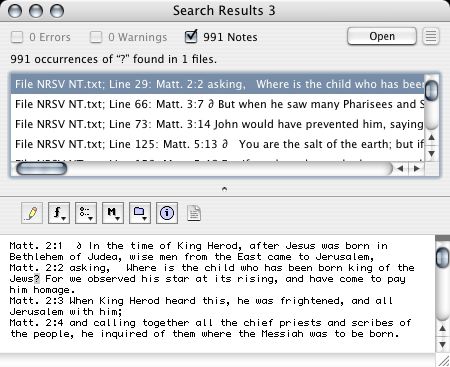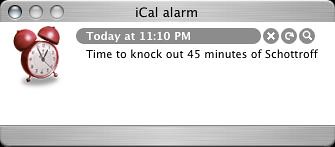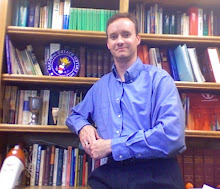I ran across a link today and was shocked to hear Pastor At Large Blogger Matthew Johnson say,
I've had some ongoing discussions with people about Bible software for Macs... I keep thinking about Bible software for Macs and in the process of asking a couple of questions of Doc Stone, I mentioned that I thought the software [choices] for Macs was terrible to which the good Doc replied:
"Bible Software for the Mac is terrible? Geeze Louise, guy, I know people who switched to the mac just so they could run Accordance. It is the slickest thing I've ever seen."
My shock is that I can hardly believe there are ministers and bible students out there who haven't heard of
Accordance. The program is superb, in interface, in search power, in module offerings, in development, in support, and on and on. If you are a bible scholar and/or a pastor (which as best I can tell comprises the vast majority of The Macintosh Biblioblog audience), there's really only one choice.
The other options are simply lacking for bible scholars and ministers. I am pro-gnu license projects, but MacSword simply prevents the use of any modern translations/texts, but along with OnlineBible is just too far behind the times in development. I still can't figure out what QuickVerse is for. I suppose if you want to look up "love" in the bible, and in some decades-old reference it would suffice. For an edutainment, multimedia app for lay folks or the Sunday School classroom, iLumina is a real option. But Accordance software has nearly every option you could possibly want, nearly every module you could want (with the exception of the elusive modern, mainline scholarly commentaries). And with version 7 coming next year, there's no end in sight.
And what about the SBL Exhibit Hall Booths? Accordance had as usual it's ridiculously busy booth of some 7 or 8 Macs with nearly as many staffers, for folks to try things out and get any hands on experience. A DVD tutorial also spanned a screen on the back wall. And then there was LOGOS.
Updated for clarity (as per Ken's good suggestions):
I was anticipating getting a chance to see their Mac app, but then they announced they are half a year behind the schedule they announced half a year ago. But what is worse, is it seems they had planned on being ready for SBL; their display booth had a lone peecee on one end and then a solitary Powerbook on the other end, void of any traffic or attention or staff, sitting beneath an enormous "Logos for Mac is Here." banner. Problem is, it wasn't.
It really looked like they had already bought the banner, so they went ahead and put it up. More embarassing is that they also set up a Mac, running the most minimal shell of a User Interface with no real functionality. It was just a small collection of menus, 90% of which did absolutely nothing, and it was running in "Safe Development Mode" at that. From what little was there to see, I was not filled with confidence that their project was in the hands of competent Cocoa coders. From the size of the package, some work has been done other than what was showing, but why didn't they get something ready to show? I could put together an app with more demonstrative potential and functionality in Project Builder in less than an hour. (Ask me and I might let you have a look at "Conformance," my specialized Bible software program streamlined for fundamentalists.) I haven't the foggiest idea why the folks at LOGOS put this embarassment up on their table, for it served only to demonstrate that they basically had nothing. They already have a slight reputation of vaporware, which is the unfortunate result of the pre-publication announcement business model they use ("We announce we're going to do project X, if enough of you pre-pay."), which I think is a good model.
But I really can't overstate that the scene at the "Mac" end of the booth just looked pathetic, so I'm puzzled why they did it. Seriously, they need to replace whatever coder they hired if she/he was given even just one afternoon to get something ready for display at the conference, and also perhaps whoever made the decision to put that out on the table for folks to see. It couldn't have had the effect of causing someone to say, "Oh, I'll not buy any Mac products for 6 months, so as to wait for LOGOS' product." It surely did more harm than good.
As I stared at the "demo" at their booth watching it do nothing, an employee came up to me and simply said, "Sorry."
LOGOS made their money, and achieved their large size, in the popular market. This is why they've not been the choice among scholars in particular. But in the last couple of years, they've been trying to enter the scholarly market, and good for them. But the performance in the Exhibit Hall at SBL only solidified that if you have a Windoze box, it seems to me best to stick with BibleWorks (unless Libronix carries a module you must have) or Accordance (which has a PC install disk as well); and if you have a Mac, there really is one clear choice of bible software.
Bob Pritchett of Logos Bible Software has offered this helpful, public response:
We have many person years into the Macintosh port already. I think the reason that it does not yet match 'what you could put together in Project Builder in less than one hour' is that we aren't aiming for a pretty demo, we are aiming for a useful product. Our porting has been from the bottom up, and our first priority has been reading the eBooks, not designing the icons.
The software we showed at SBL reads more than 5,000 reference works we have already released on Windows. Without changes, without recompiles. While we want to have a great looking product, and plan to, we believe the real star of any Bible software release is the content...
The banner was made for the conference the week before; it even said "Spring 2006" right on it. The "It's Here" meant you could see it working right here, which you could. I'm sorry the demo wasn't prettier.
As to the vaporware charge, I think it's patently unfair. The pre-pub program is clearly explained, and more than 95% of pre-pubs actually make it to publication.
I agree with Bob and said as much that I think the side effect of the pre-pub program is unfortunate. But, my impression at the booth was in fact my impression, and I don't see why if you're going to demo something, why not take at least an hour to put together something that might make a positive impression? If the banner was to imply, "you could see it working right here," it seems a good strategy would be to have something working right there.
And one final bit of advice, as for "5,000 reference works we have already released... we believe the real star of any Bible software release is the content," I suggest taking a harder look at the high priority placed on User Interface standards we expect to see on our beloved Macs. Some 80 to 90% of the works in every bible software package is out-of-date crap fluff, so don't try and impress me with numbers. We want content we should be using, not just what we can get our hands on or what is cheap, and we want it in a beautiful, intuitive interface.

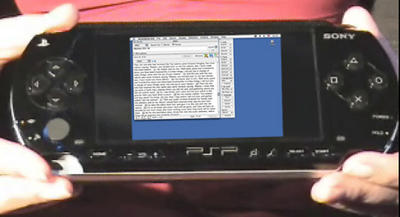

 After catching up on my blogroll, I wanted to pass on to folks a great article explaining how OpenOffice might be a solution for you in your scholarly work, particularly if you need to work with Right-to-Left Hebrew.
If you find yourself to be "open curious", definitely
After catching up on my blogroll, I wanted to pass on to folks a great article explaining how OpenOffice might be a solution for you in your scholarly work, particularly if you need to work with Right-to-Left Hebrew.
If you find yourself to be "open curious", definitely  in the Judean desert around the dead sea, presumably from the Bar Kochba revolt period. I find it interesting, and actually quite appropriate, that it was only 143 words into the article before we find the word "forgery(ies)".
in the Judean desert around the dead sea, presumably from the Bar Kochba revolt period. I find it interesting, and actually quite appropriate, that it was only 143 words into the article before we find the word "forgery(ies)".
 (Yes, I have a 3 year old daughter and learned some of my Spanish from
(Yes, I have a 3 year old daughter and learned some of my Spanish from 
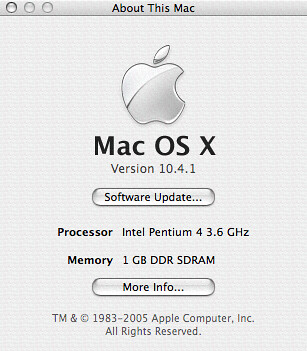 Really, this means very little to you, typical bible scholars and pastors. It does mean that Macs will get faster quicker and/or possibly less expensive. Newer version of applications will be able to run natively on both older PPC computers or Intel machines. But still, your "old" OS X apps will run on the newer processors via a tranparent translator (which they've named "Rosetta"!) without any performance or speed issues. It will be the end of 2007 before Apple before the entire Macintosh computer line runs on an Intel Pentium processor. It means that apps that currently run only in Classic mode might be left behind (until someone writes a new emulation).
Really, this means very little to you, typical bible scholars and pastors. It does mean that Macs will get faster quicker and/or possibly less expensive. Newer version of applications will be able to run natively on both older PPC computers or Intel machines. But still, your "old" OS X apps will run on the newer processors via a tranparent translator (which they've named "Rosetta"!) without any performance or speed issues. It will be the end of 2007 before Apple before the entire Macintosh computer line runs on an Intel Pentium processor. It means that apps that currently run only in Classic mode might be left behind (until someone writes a new emulation).



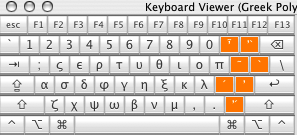
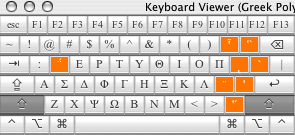
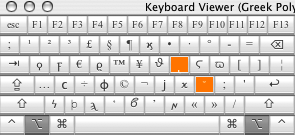
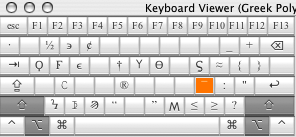 It looks like the keys are mapped close to the Greek national keyboard, including:
It looks like the keys are mapped close to the Greek national keyboard, including:

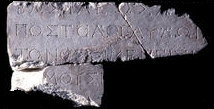
 It has through the years maintained an innovative and incredibly powerful feature set and searching capability unparalled by anything available on any platform to date. The pairing with the Macintosh OS has of course been an added treat, but I hope y'all know that Accordance runs quite well on a PC with a simple
It has through the years maintained an innovative and incredibly powerful feature set and searching capability unparalled by anything available on any platform to date. The pairing with the Macintosh OS has of course been an added treat, but I hope y'all know that Accordance runs quite well on a PC with a simple 